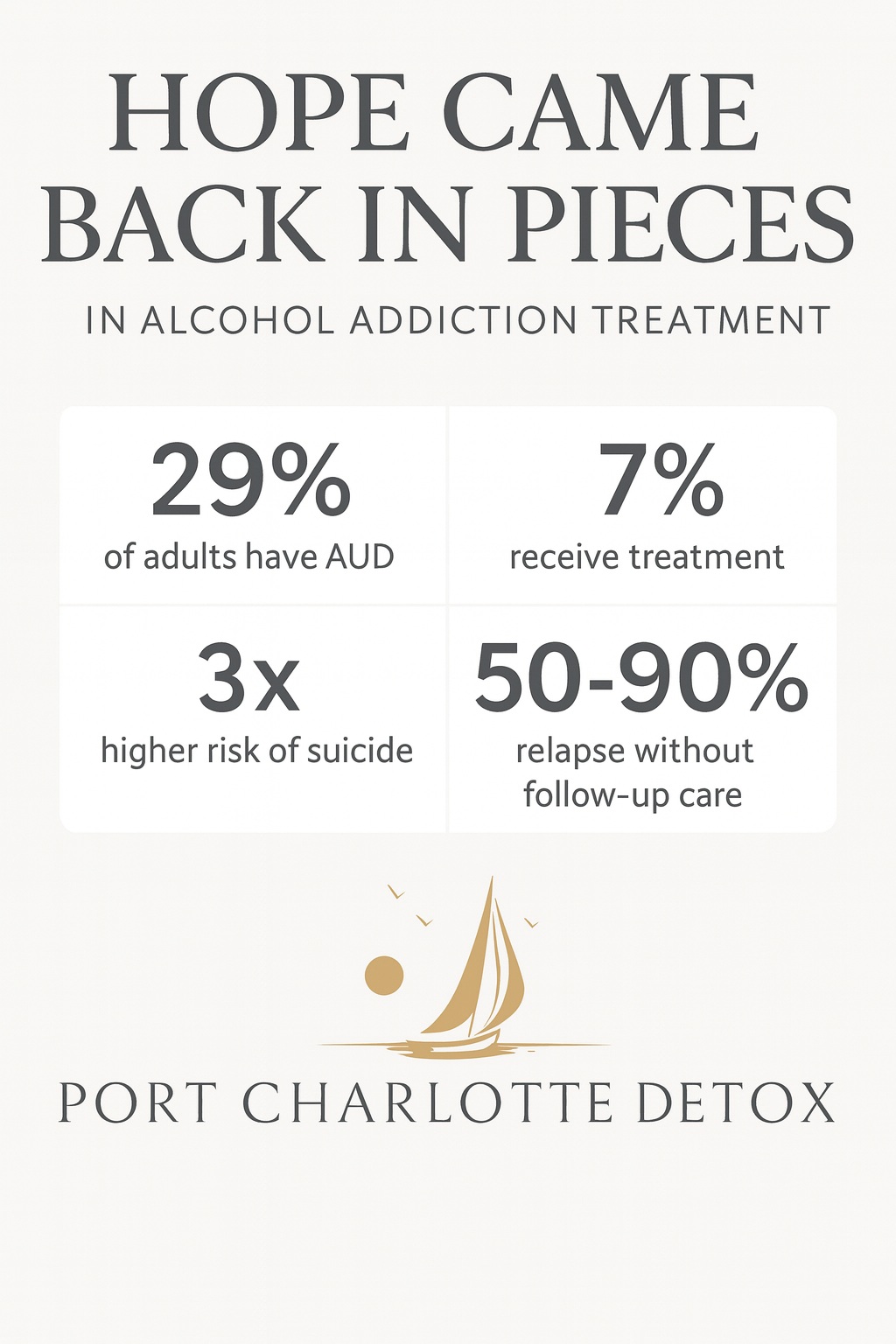I didn’t want to die. I just didn’t know how to live anymore.
That sentence lived in the back of my mind for months. I wasn’t planning to end things, but I also wasn’t planning much of anything. Every day felt like a slow erasure — of sleep, of energy, of self. I was drinking to quiet the noise in my head, and the silence afterward scared me even more.
When I finally reached out for help, it wasn’t because I had faith in recovery. It was because I had run out of options. Someone at a local crisis line said there was a place nearby — alcohol addiction treatment in Port Charlotte, Florida — and asked if I’d go. I said yes, mostly because saying no would’ve taken more energy than I had.
The First Day: Just Breathing
Detox wasn’t what I expected. No bright lights, no harsh judgment. Just a quiet space and people who spoke softly — as if they understood that my nervous system had been screaming for months.
A nurse took my vitals and said, “You’re safe now. We’ll help you through this.”
Safe. I hadn’t felt that in a long time.
I didn’t talk much. My head hurt. My hands shook. But someone brought me water and told me to rest. That was the first thread of hope — not the kind that fixes everything, but the kind that says, You don’t have to fall apart alone.
The Body Starts Healing First
No one tells you how physical detox is. I had imagined it as emotional repair, but before anything could change in my mind, my body had to stop fighting itself. The staff at Port Charlotte Detox helped manage my withdrawal symptoms, checking on me through the night.
The first few days blurred together. There were sweats, chills, headaches — and then, slowly, sleep. Real, heavy, healing sleep. I woke up one morning and realized I hadn’t dreamed of drinking or dying. Just sleep. That tiny bit of peace cracked something open.
I started to believe that maybe I could make it through another day.
Watching Others Heal Gave Me Permission
In the treatment center, I wasn’t the only one walking that tightrope between exhaustion and hope. Some people talked openly about their lowest points. Others stayed quiet like me, showing up because someone told them it might help.
One guy said something that stuck with me:
“I didn’t think recovery was for people like me. But it turns out, I just needed a place to be broken without being judged.”
That hit me harder than I expected. Because I didn’t want to be fixed — I just wanted to stop hurting. Seeing others heal didn’t make me jealous; it made me curious. Could that be me someday?
That quiet curiosity became the seed of wanting to live.
Hope Came Slowly — Like Dawn Breaking Through Clouds
I remember the morning I noticed the light again. It wasn’t a dramatic sunrise, just a thin strip of gold sneaking through the blinds. I sat up and didn’t feel dread pressing on my chest. I thought, Maybe I can eat breakfast today.
That was it — no revelation, no big turnaround. Just breakfast.
But when you’ve been numb for so long, wanting anything at all feels like a miracle.
Recovery, I learned, isn’t about constant motivation. It’s about noticing when the heaviness lifts, even for five minutes, and letting that matter.
When the Numbness Returned
Some days, I slid backward. The sadness came back sharper because I could finally feel it without the alcohol dulling it. I told a counselor I felt worse, and she said something I still repeat to myself:
“Feeling again doesn’t mean you’re falling apart. It means your system is waking back up.”
That’s what alcohol addiction treatment does at its best — it doesn’t erase pain; it helps you hold it safely until it becomes bearable.
On the bad days, staff checked in. No lectures. Just questions like, “Do you need company?” or “Would you like to take a walk?” Those small acts were lifelines.
The Quiet Gifts of Connection
Somewhere between day seven and day ten, I started talking in group. Not much — just pieces. About how lonely drinking had become. About how I was tired of pretending I was fine. And nobody flinched. Nobody tried to fix it.
One woman said, “I’ve been there. It’s okay to not know what hope feels like yet. It’ll find you when you’re ready.”
I didn’t believe her then. But looking back, she was right. Hope didn’t crash in like a wave; it crept in like fog, soft and slow, until one day, I realized I could see a few feet ahead again.
Recovery Wasn’t the End. It Was a Beginning.
By the time I finished detox, I still didn’t have it all figured out. I still had anxiety, cravings, questions. But I also had something new: a chance to try. The team helped me plan my next step — ongoing therapy, support groups, structure.
They told me relapse doesn’t erase progress. That healing isn’t about perfection, it’s about returning to yourself, again and again.
Leaving treatment didn’t mean I had to leave support. It meant I could carry it with me.
For Anyone in Charlotte County Who Feels Done but Not Gone
If you’re reading this from Charlotte County or nearby Fort Myers, FL, and you’re somewhere between wanting out and wanting help — please don’t decide in the dark. There’s room for you here. There’s help that doesn’t demand performance, only presence.
You don’t need to be ready to change your whole life. You just need to be willing to let someone keep you safe while you start to rest.
Hope Doesn’t Arrive All at Once. It Returns in Pieces.
That’s what alcohol addiction treatment gave me: space to let hope come back in fragments — through a clean shirt, a steady hand, a shared laugh, a moment of quiet safety.
If you’re tired of trying to hold it all alone, there’s no shame in needing help. You deserve peace, even if you don’t believe that yet.
You don’t have to die to stop hurting. You just have to stay long enough for help to find you.
FAQ: Alcohol Addiction Treatment in Port Charlotte, FL
What happens during alcohol detox?
During detox, your body clears out alcohol while medical staff monitor your safety and comfort. At Port Charlotte Detox, withdrawal symptoms are managed with compassion and medical support, ensuring you don’t have to go through it alone.
Is detox the same as treatment?
Detox is the first step of recovery — it helps stabilize you physically so you can begin emotional healing. Many clients transition from detox into longer-term treatment programs or therapy for lasting change.
What if I’m scared to start?
It’s normal to feel afraid. Treatment doesn’t require you to be ready forever — just willing to start. The team at Port Charlotte Detox will guide you gently, explaining each step and giving you space to breathe.
How long does alcohol detox take?
Most detox programs last between 5–10 days, depending on your health, drinking patterns, and any co-occurring symptoms. Every plan is individualized for safety and comfort.
Can I come to treatment if I’m feeling hopeless or suicidal?
Yes. You don’t need to be at peace to start healing. If you’re struggling with suicidal thoughts, treatment can help you stabilize, find safety, and begin addressing both alcohol use and emotional pain together.
📞 You’re Not Alone. Hope Can Start Here.
Call (844)336-2690 or visit Port Charlotte Detox’s alcohol addiction treatment program to learn how healing begins—one small, quiet step at a time.



